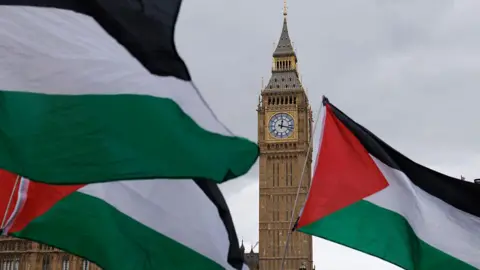Political correspondent
 Getty Images
Getty ImagesAs Sir Keir Starmer made his address inside Number 10, I was stood outside in a noisy – deafening even – Downing Street.
Gaza protestors were making themselves more than heard with drums, sirens and whistles.
It was a visible, visceral demonstration of the public pressure the prime minister has come under to toughen his stance on Israel.
Public pressure, but also political pressure.
More than half of Labour backbench MPs signed a letter demanding the government recognises a Palestinian state.
Several ministers in the cabinet have been joining the lobbying behind the scenes.
In recent weeks there has been a hardening of the government’s language. Today a hardening of the government’s position.
And make no mistake. This is a big change in British foreign policy.
It has long been a Labour position to recognise a Palestinian state as part of a peace process and at a time of maximum impact.
Sir Keir has decided that time is now.
There are important caveats. The prime minister said the UK will recognise a Palestinian state in September unless the Israeli government takes “substantive steps to end the appalling situation in Gaza”.
There were three particular demands. That Israel:
- Reaches a ceasefire
- Makes clear there will be no annexation in the West Bank
- Commits to a long-term peace process that delivers a two-state solution
There were also demands on Hamas. The government said they must:
- Immediately release all of the hostages
- Sign up to a ceasefire
- Disarm and accept that they will play no part in the government of Gaza
There is a question over how realistic the conditions are.
Given the makeup of the Israeli government, which relies on support from far-right ministers opposed to a two-state solution, it seems highly unlikely Israel will agree.
I am told Sir Keir spoke to Israel’s Prime Minister Benjamin Netanyahu before the cabinet meeting this afternoon.
Whether Hamas would accept disarming and having no part in the government in Gaza is also highly questionable.
The conditions have already been criticised, including by some Labour MPs like Sarah Champion who led the lobbying for the government to make this move.
Champion says she is “troubled our recognition appears conditional on Israel’s actions”.
“Israel is the occupier, and recognition is about the self-determination of the Palestinian people,” she adds.
The Conservatives say this is just “designed to appease his backbenchers” and “will not secure lasting peace”.
So will the government go ahead with recognising a Palestinian state if only some of those conditions are met?
What if, for example, there is a ceasefire but not much progress to a two-state solution?
I’m told by senior figures in government that decision will be made in September.
But now that the prospect of British recognition of a Palestinian state is a realistic prospect, it will be difficult for the government to row back from that, particularly given the fact so many Labour MPs will demand it goes ahead.
So why now? And will it make any difference to the situation in Gaza?
Sir Keir says this is the right moment partly because the humanitarian crisis in Gaza is so dire.
And, partly because he said he was “particularly concerned that the idea of a two-state solution is reducing and feels further away today than it has for many years”.
The key question is: will this end up being anything more than a symbolic gesture?
The prime minister wants to avoid that.
The conditions are designed to put pressure on Israel to change course.
However, the US has far greater influence over Israel – and the country’s long-standing position is to only recognise a Palestinian state as part of moves towards a long-term resolution to the conflict.
Donald Trump has suggested doing so now would “reward Hamas”.
Sir Keir wants to show he is a serious leader who can have a real impact on the global stage.
Whether that aim is realised is now, largely, in the hands of Netanyahu and Trump.








